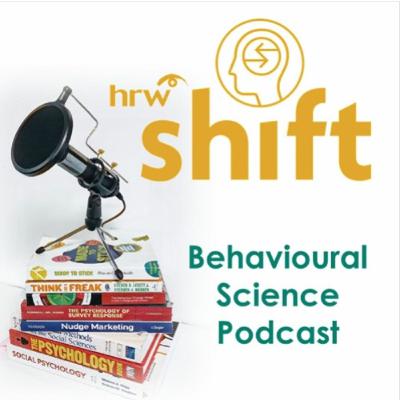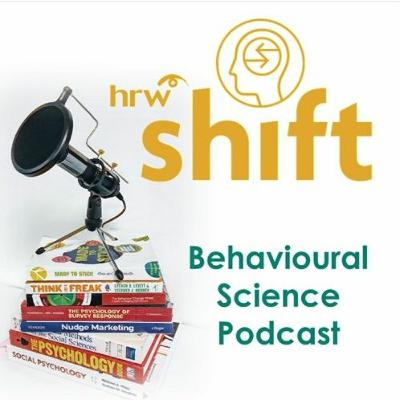Discover HRW Shift Podcast
HRW Shift Podcast

HRW Shift Podcast
Author: HRW Shift Behavioural Science Consultancy
Subscribed: 9Played: 77Subscribe
Share
© All rights reserved
Description
Podcasts from HRW Shift, a specialist multidisciplinary behavioural science team of experts within the healthcare market research agency Healthcare Research Worldwide (HRW). HRW are a global agency dedicated to 'accessing reality'; taking a scientifically-rigorous, collaborative, holistic approach, utilising and developing the best and most appropriate consumer and healthcare techniques (qual, quant and online), whatever the respondent type, anywhere in the world across the whole healthcare sector (pharma, device and diagnostics, OTC, personal care, medical nutrition, babycare....). It's research that reflects the real world, to help you make the right business decisions.
42 Episodes
Reverse
From sleepless nights to endless cuddles, parenting feels transformative, but does parenting change our brain?
In our latest HRW Shift podcast, Jeremy, Behavioural Scientist is joined by Rifah, who holds a degree in Neuroscience, as they dive into the fascinating neuroscience behind parenting. The pair explore how our brains adapt to caregiving, how the science of bonding rewires us emotionally, and what surprising insights the latest research is uncovering.
Whether you’re a parent, thinking about becoming one, or just curious about the human brain, this podcast is for you!
This month's podcast from HRW Shift revisits our 4th Annual Celebration of Behavioural Science webinar series, where we addressed your top behavioural science queries and offered your business FREE advice!
Have you ever thought about pursuing a career in Behavioural Science?
In our latest podcast, HRW Shift share their journey into their careers, including what they look for in standout applicants, the lessons they’ve learnt along the way and what they might do differently to benefit their experience.
Many recognise how behavioural science enhances qualitative research through guiding interviews and questionnaires to uncover unconscious biases and underlying motivators. However, when it comes to quantitative studies, some remain uncertain about its role in interpreting the data.
In HRW Shift’s latest podcast, ‘Why Behavioral Science & Quantitative Research Are Perfect Partners,’ Saket and Jeremy, both Behavioural scientists, join Nicola, Senior Director and Head of Quant Research, to explore how behavioural science can enrich every phase of quantitative research.
In the second segment of HRW Shift’s podcast, ‘Antibiotic Resistance Communications’, Jeremy, Behavioural Scientist, and Kate and Sam, Behavioural Science Analysts share the potential solutions HCPS, patients, and public initiatives can do to help curve the acceleration of AMR.
Episode 35: Antibiotic Resistance Communications by HRW Shift Behavioural Science Consultancy
Episode 34: Self Nudging by HRW Shift Behavioural Science Consultancy
In the final segment of our 3-part podcast series, Saket Rao, Behavioural Scientist, shares findings from his master’s dissertation, focusing on suicidal ideation using linguistic analysis on the social media platform, Reddit.
We hope you enjoy, from HRW Shift and HRW Eavesdrop!
As part of our 3rd Annual Celebration of Behavioral Science webinar series, HRW Shift, our team of award winning, in-house Behavioural scientists, dug into your burning questions, from how you can implement Behavioural science within your work, to strategies designed for specific biases.
During the launch of the COVID-19 vaccine, a significant amount of content circulated expressing skepticism about the reliability and trustworthiness of the available vaccines.
As individuals, our tendency to be influenced by the actions and emotions of others becomes particularly pronounced when faced with uncertainties, which also extends to our perceptions of vaccines.
In our HRW Shift‘s latest podcast, Alexandra Petrache, Senior Behavioural Science Analyst and Dana Al-Juburi, Research Manager, explore the impact of language in vaccine distribution and discuss strategies including leveraging social identity, incorporating personal anecdotes and stories to evoke emotions, and the benefits of transparency about limitations and uncertainties of the vaccines.
Harvard data shows that over the years, implicit bias against race, sexuality, age, and disability have all decreased. However, implicit bias against those who are overweight is the only group bias that has become more severe over time.
It is plausible that exposure to more positive thin people and negative overweight people in society could be responsible for the strengthening of implicit anti-fat bias. Social media platforms are a key leader when it comes to the ‘thin ideal’, with the prevalence of photo manipulation, and the pressure to confirm to beauty standards and present this as an online highlight.
In HRW Shift’s latest podcast, Alex, Senior Behavioural Science Analyst, Millie, Research Executive and cofounder of HRW Eavesdrop, our innovative social media listening offering that is soon to be launched, are joined by @Emma, who is currently training to be a psychotherapist, with a background in Behavioural Science (specifically discourse analysis), as they share part 2 of our 3-part podcast series surrounding social media and mental health, discussing social media’s impact on the perfect body image, and how we can keep our biases in check.
Recommended reading:
-"What we don't talk about when we talk about fat" by Aubrey Gordon
The so-called reality or standards that social media continues to enforce is reshaping people’s social norms and attitudes, leaving more and more people left with either very poor self-esteem, or with the motivation to reach those standards take on very physically and mentally unhealthy behaviours and attitudes.
Join Alexandra Petrache, Senior Behavioural Science Analyst and Millie Morgan, Research Executive and cofounder of HRW Eavesdrop, our innovative social media listening offering, as they share part 1 of our 3-part podcast series surrounding the relationship between social media, mental health and the depiction around these social aspects online using linguistic analysis techniques.
References:
1.What we don't talk about when we talk about fat by Aubrey Gordon
2. Barry, C. T., Sidoti, C. L., Briggs, S. M., Reiter, S. R., & Lindsey, R. A. (2017). Adolescent social media use and mental health from adolescent and parent perspectives. Journal of adolescence, 61, 1-11.
3. Tankovska, H. (2021). Number of monthly active Instagram users 2013-2018. Statista. https://www.statista.com/statistics/253577/number-of-monthlyactive-instagram-users/
4. Woods, H. C., & Scott, H. (2016). # Sleepyteens: Social media use in adolescence is associated with poor sleep quality, anxiety, depression and low self-esteem. Journal of adolescence, 51, 41-49.
5. Vogel, E. A., Rose, J. P., Roberts, L. R., & Eckles, K. (2014). Social comparison, social media, and self-esteem. Psychology of Popular Media Culture, 3(4), 206.
6. Muralidhara, S., & Paul, M. J. (2018). # Healthy selfies: exploration of health topics on Instagram. JMIR public health and surveillance, 4(2), e10150.
7. Sidani, J. E., Shensa, A., Hoffman, B., Hanmer, J., & Primack, B. A. (2016). The association between social media use and eating concerns among US young adults. Journal of the Academy of Nutrition and Dietetics, 116(9), 1465-1472.
8. Neumark-Sztainer, D. (2005). I'm, like, SO fat!: helping your teen make healthy choices about eating and exercise in a weight-obsessed world. Guilford Press.
You know that moment when you think you might be releasing a podcast in March, but you postpone the recording once, twice...and a few more times, so it actually gets released in April? We do! Guilty!
Have a listen of our podcast to see what Agatha Christie, wills, and wine subscription may have in common (or may be tenuously stretched to have something in common). Find out why we may procrastinate and quick tips on how to avoid procrastination
We are happy to present part two of our series exploring the common biases that HCPs and patients face! In our latest we explored some of the biases that often crop up in HCP research and strategies to counter them. Today we'll be discussing the biases that we repeatedly encounter in patient research and how to best respond to them.
Tune in as our behavioral scientists help elucidate the patient experience and run through biases such as emotional overload, learned helplessness, illusion of transparency, and many more!
At HRW we do a lot of HCP research and as HCPs are affected by cognitive biases like all of us, we're put together this bite-sized podcast to explore biases that come up in HCP research and how they can be explored in market research and overcome.
This is part of a two-episode short series- join us in the New Year for the podcast where we discuss common biases that we've encountered in patient research!
"You scratch my back, I scratch yours". Standard economics considers individuals selfish, but behavioural economics explains that reciprocity (returning someone's actions)is an evolutionarily ingrained concept, which we see at play every day: have you ever bought or considered buying a product when someone offered you a sample? Have you put more effort into a work-out because the trainer was nice?
Join Tony Jiang, Behavioural Science Analyst, and Alexandra Petrache, Senior Behavioural Science Analyst, as they discuss reciprocity!
*Note: on the podcast, we talked about a study which identified a correlation between doctors being offered meals from sales rep, with the apparent effect of an increase in the prescription of branded drugs. We'd like to note that transparency provisions are now in place to preclude this, as well as to forbid provisions of meals or any gifts from pharmaceutical companies
Would you like strawberry or blackberry jam? What about the percentage of fruit in the jam? Sweetener, sugar? What brand?
Join us as we talk about choice overload- when "more" is not always "better", how it can affect our decision-making, where we've encountered it in the healthcare space, and what to do if you would like to ease it for your customers and give them a helping hand in making decisions
Which biases are under recognised in healthcare marketing or market research?
Where do you stand on using facial coding, eye tracking and voice tonality recognition in your research?
During our second Annual Celebration of Behavioural Science we answered your questions! Have a listen to see what the Shift team had to say and what biases they encounter in their work or personal lives!
Patient empowerment is more complex than just ramping up patient education- physicians, carers and the community are all important! To find out more and to look beyond traditional patient empowerment, listen to this interview with Emma Neville (MPhil History and Philosophy of Medicine and Behavioural Scientist at HRW)
How much does your current self help your future self? Do you often take actions to safeguard your financial future or develop beneficial habits?
The degree to which we do it varies from individual to individual, but behavioural science can help us shed light on certain biases that we tend to be susceptible to and that can help dismantle the work that our current selves puts in for our future selves. That behaviour can even be hinted at by the language we use and it is extremely important to be mindful of when carrying our market research and asking the current selves of respondents questions about what the future holds
Join Alex, Emma, David and Jeremy on a journey to discover why we don't always act in the best interest of our future selves and how we might be able to change that









